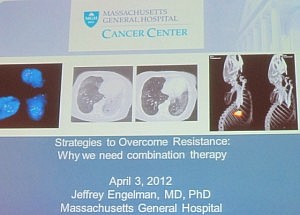AACR 2012: Future is combinations of novel cancer agents
A standing room only audience at the recent annual meeting of the American Association for Cancer Research (AACR) heard from several distinguished speakers on what the future of cancer drug therapy is likely to look like: combinations of novel cancer agents.
This AACR session was one of the highlights of the meeting and would have merited from being part of the plenary program.
 Jeffrey Engelman from MGH persuasively presented on why we need combination therapies to overcome resistance. He noted that:
Jeffrey Engelman from MGH persuasively presented on why we need combination therapies to overcome resistance. He noted that:
- Most cancers are not sensitive to currently available single-agent therapies
- Even when sensitive to single-agent therapies, cancers develop resistance, often necessitating combinations
One of the challenges of this approach will be “identifying effective combinations,” he said.
Roy Herbst from Yale, presented on some of the practical challenges involved with the early phase testing of two drugs, and challenged the audience with a critical question:
“Do we possess the necessary translational tools that will help us identify the right drug combinations, ratios and schedules with the right patient?”
Stuart Lutzker from Genentech described their experiences of clinical trials with rational drug combination of trastuzumab and pertuzumab for HER2+ breast cancer. He concluded that:
“Rational drug combinations have begun to yield exciting Phase III results and should be preferred over empiric drug combinations.”
The Pharma Strategy Blog video interview with Gordon Mills from ECCO/ESMO 2011 in Stockholm offers some interesting insights into how MD Anderson are helping to facilitate academia-industry combination trials with novel compounds from different companies in order to achieve more rational drug design and improve outcomes for people with cancer.
http://youtu.be/FXkcSry6EtQ
If two or more novel cancer drugs are required to interrupt key pathways or to avoid adaptive resistance, what does this mean for the regulatory strategy?
Janet Woodcock addressed some of these challenges in her AACR presentation, and discussed how the:
“FDA would not want to approve a combination regimen with two new agents unless each contributed to the effect.”
Draft guidance on “Codevelopment of Two or More Unmarketed Investigational Drugs for Use in Combination” was published by the Agency in December 2010. Click here for a PDF copy.
The document gives examples of a number of different phase II trial designs that can be used to demonstrate the contribution each drug makes to the combination, and the additive effect seen.
As an example, if each drug in a combination has activity and can be administered individually then the guidance document suggests a multi-arm phase II trial may be needed that compares the impact of either drug alone versus the combination and standard of care. An adaptive trial may also be used if appropriate.
Dr Woodcock noted that future cancer drug development is likely to include increasing use of combinations, adaptive trials to evaluate various drug and diagnostic combinations and increasing attention to the use of novel biomarkers.
The message I took home from the AACR annual meeting is that the future of cancer therapy is in combinations, and we can expect more clinical trials with two unapproved agents (novel-novel combinations) in the future.
4 Responses to “AACR 2012: Future is combinations of novel cancer agents”
Speaking as a cancer patient (currently in remission) I applaud these efforts and hope the combination of drugs will lead to better outcomes for patients in the future.
Suzan St Maur
Vice-chair, MK Cancer Patient Partnership
Patient Representative, Thames Valley Cancer Network (UK.)
Hope this will be the start of many more, Suze, this was a meeting where many early exciting compounds began to re-emerge – a good sign for the future!
I agree with Suze, and your excellent analysis that the future efforts of drug combinations will make better outcomes for patients
Sarah, thank you for taking the time to comment and read my post. Better outcomes for patients is indeed what all cancer research & drug development is about.
Comments are closed.